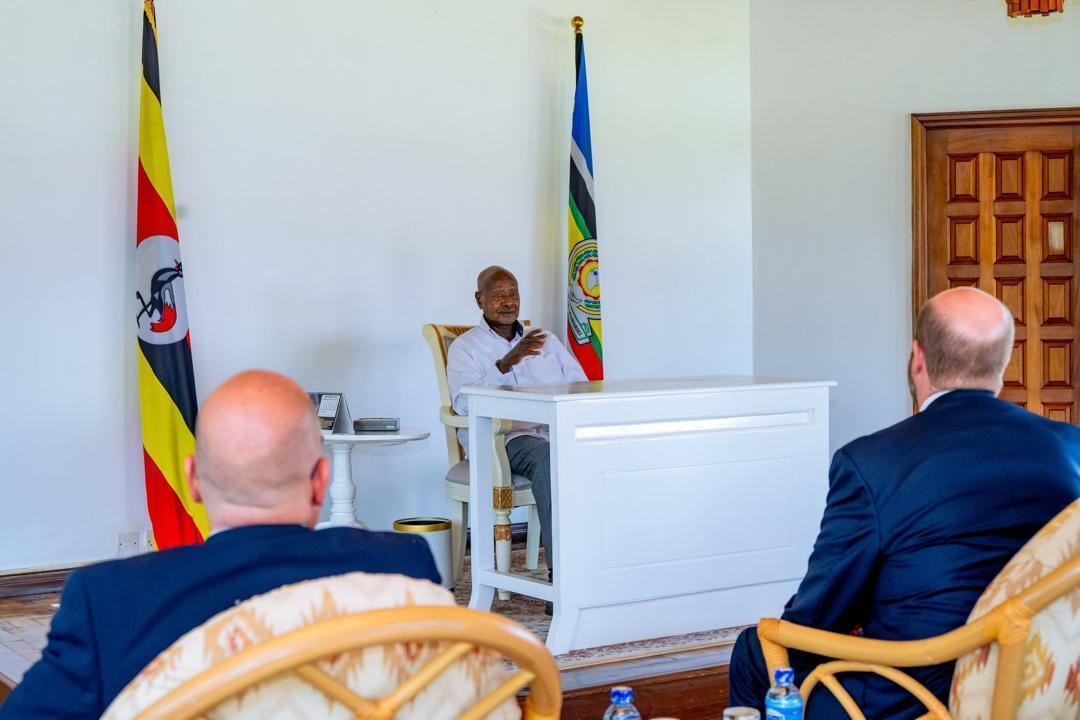By Faridah Kulumba
Africa-Press – Uganda. Uganda’s Minister of Defence and Veteran Affairs, Hon. Jacob Marksons Oboth, recently held talks with a delegation of Professional Staff Members from the United States House of Representatives Foreign Affairs Committee, led by the US Ambassador to Uganda, H.E. William Popp.
The two leaders’ engagements took place in Uganda at the Ministry of Defence and Veteran Affairs headquarters, focusing on enhancing bilateral relations between Uganda and the United States, particularly in the area of defence.Among other officials who attended the meeting included the Permanent Secretary, Mrs. Rosette Byengoma; Deputy Chief of Defence Forces, Lt Gen Sam Okiding; Chief of Joint Staff, Lt Gen Jack Bakasumba; Commander Land Force, Lt Gen Kayanja Muhanga; Chief of Defence Intelligence and Security, Maj Gen Richard Otto; Director Legal Affairs, Maj Gen Aloysius Kagoro; the US Defence Attaché to Uganda, Lt Col Christian Noumba and senior officers.
Strategic meeting
Uganda government seeks to repair bilateral relations with Washington after the U.S Department of State announced a visa restriction policy on Ugandans, particularly government officials for undermining democracy and for repression in Uganda and the suspension of the country from the African Growth and Opportunity Act (AGOA) in 2023 during President Joe Biden’s tenure, after the passage of the Anti-Homosexuality Act. The State Department’s most recent human rights report documented serious restrictions of political rights, extrajudicial killings, enforced disappearances, and torture by state agencies in Uganda. Security forces “often” arbitrarily arrest and detain people, particularly opposition supporters, activists, demonstrators, journalists, and lesbian, gay, bisexual, and transgender.
Motives for tightening defence relations
According to Uganda’s Ministry of Defence the strong partnership between the two countries supports regional counter-terrorism operations. Minister Oboth noted that combating terrorism is a global effort that cannot be undertaken by a single nation.He highlighted Uganda’s ongoing operations in Somalia and the eastern Democratic Republic of Congo, describing them as guided by a spirit of Pan-Africanism. “We have one country that we must preserve, but we cannot preserve it when our neighbours are not at peace,” Oboth said.Uganda has been a reliable partner for the United States in promoting stability in the Horn and East/Central Africa and in combatting terror, particularly through its contribution to the African Union Mission in Somalia.
Acknowledgement
On behalf of the U.S, Ambassador Popp commended the Uganda Peoples’ Defence Forces (UPDF) for maintaining security in the Great Lakes region, contributing to cross-border peace, and supporting counter-terrorism efforts in Somalia. The Professional Staff Members is a political, non-partisan high-level committee of the House of Representatives whose advice is highly regarded by parties in the USA.
How the two nations work on mending fences
The two countries belong to a number of the same international organizations, including the United Nations, International Monetary Fund, World Bank, and World Trade Organization. They have had frequent meetings recently. In August 2025 President Yoweri Kaguta Museveni hosted the United States Ambassador to Uganda, William W. Popp, for high-level talks aimed at strengthening bilateral relations and boosting trade between the two countries.The meeting that was held at State House Nakasero in Kampala, came after Museveni’s telephone call with U.S Secretary of State Marco Rubio, during which the two discussed migration cooperation and the expansion of commercial ties.The U.S established diplomatic relations with Uganda in 1962, following Uganda’s formal independence from the United Kingdom. In the post-independence period, the country endured despotism and near economic collapse. The human rights abuses of several Ugandan governments have strained U.S.
Relations with Uganda
On 17th January 2025, President Museveni met with a delegation from the U.S and held talks. the discussions focused on strengthening partnerships in trade, infrastructure development as well as other areas of mutual interest between the two nations.In line with the new U.S Administration, the team assured President Museveni of strengthened bilateral relations between Uganda and Washington.
U.S. funds to Uganda
The United States provides significant health and development assistance to Uganda, with a total assistance budget exceeding USD 950 million per year. The U.S. government plays a key role in improving health outcomes by strengthening Uganda’s capacity to sustainably address emerging health threats, tuberculosis (TB), malaria, maternal/child health, family planning, and HIV/AIDS (including by providing anti-retroviral treatment for more than 1.2 million Ugandans). The U.S assistance also focuses on boosting economic growth and agricultural productivity, including through improving educational outcomes; and supporting democratic governance through inclusive, accountable institutions. The U.S. mission is working with the government of Uganda to improve tax collection and oil revenue management, and to increase Uganda’s domestic funding for public services and the national response to HIV/AIDS. America has long been Uganda’s largest aid donor, despite tensions in the relationship, with a majority of U.S. assistance focused on global health programs. Recent changes to U.S. foreign assistance by the Trump Administration, which have spurred debate in Congress and legal action, have implications for Uganda and U.S. engagement. The State Department has not published details on which U.S.-funded programs in Uganda have been terminated, but press reports, court filings, and accounts from implementers highlight some reported impacts of the U.S. funding disruption in the country.
For More News And Analysis About Uganda Follow Africa-Press






